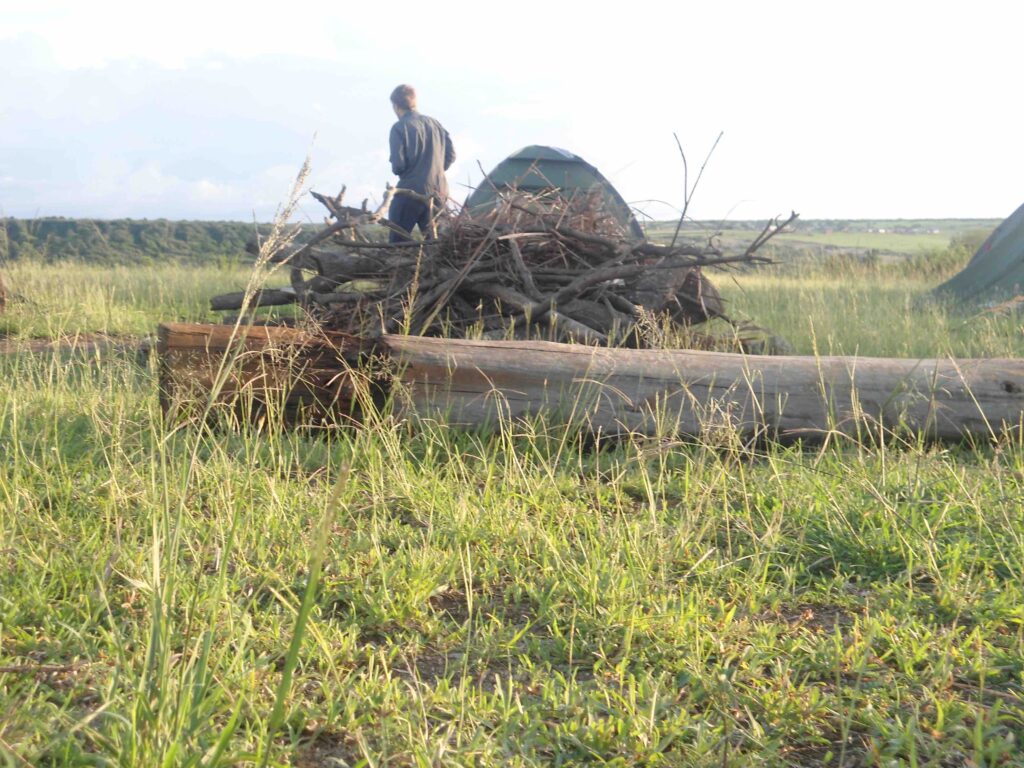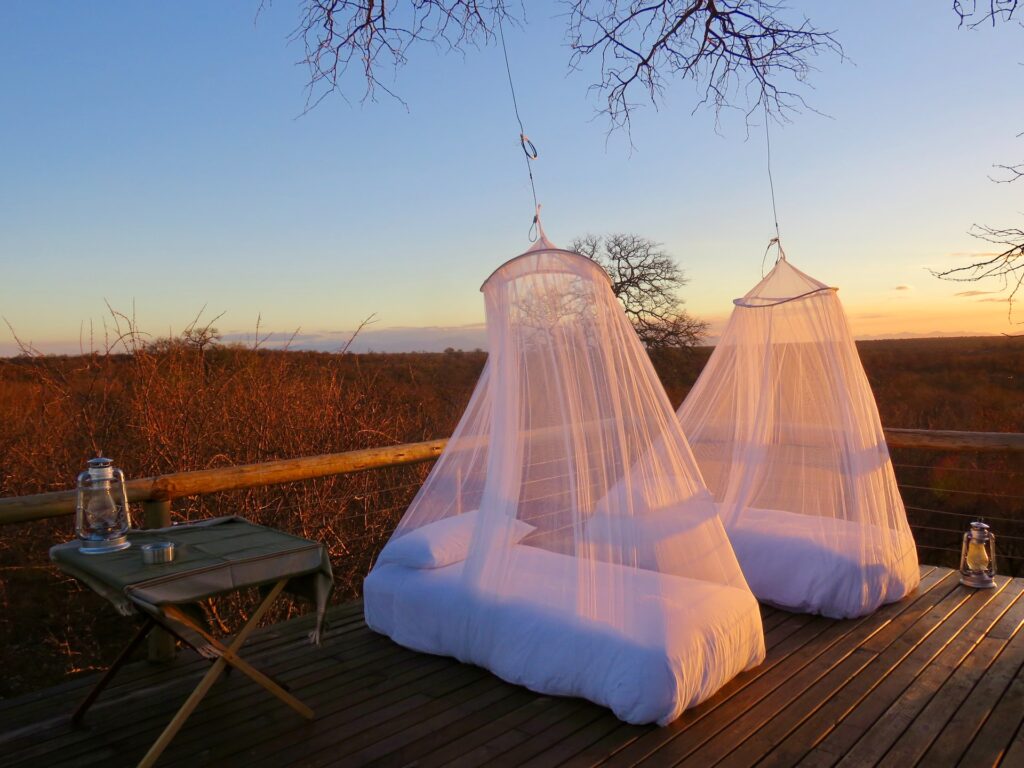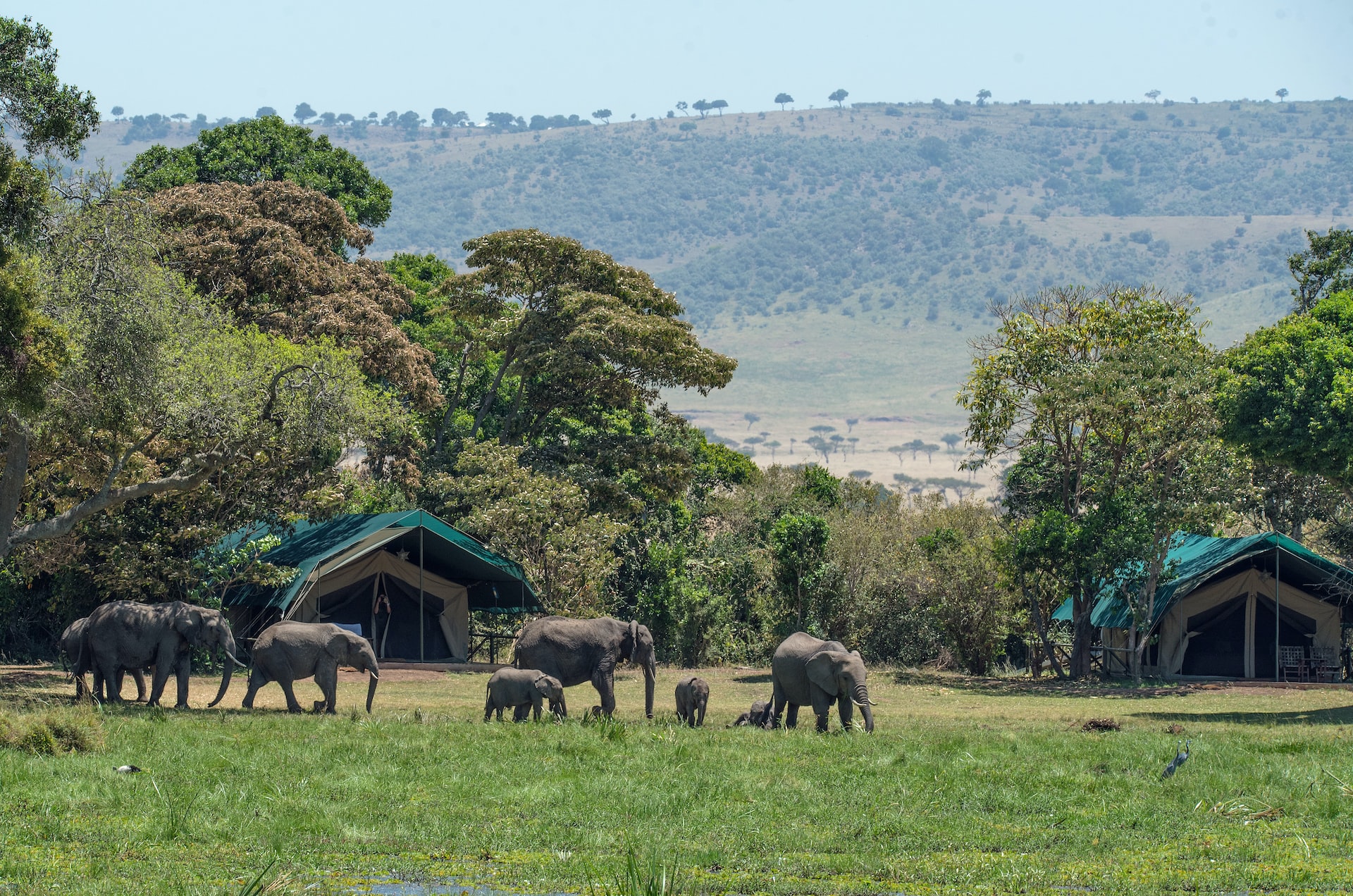Table of Contents
- Pros and cons of camping in Uganda
- My tips for camping in Uganda
- The verdict: Is camping in Uganda a good idea?
I’ve been camping in Uganda on three separate occasions. The first was on the shores of Lake Bunyonyi and was a great experience for more reasons than one (bar the mosquitos!).
On the other two occasions that I decided to sleep in the great outdoors in Uganda, I did so within the confines of Queen Elizabeth National Park and Murchison Falls National Park, respectively.
Sitting around a campfire with a few cold beers while looking up to the stars was pretty special on both occasions, and I loved the fact that warthogs and monkeys were in and around the campsites.
Listening to the hippos throughout the night was also pretty memorable, even though I’m grateful that they didn’t get too close!
Outside of Uganda, I packed a tent and sleeping supplies and traveled with a high school buddy across Malawi and Zambia, before making our way down to South Africa on a camping/budget trip.
So, I have a few experiences of camping trips in East Africa and beyond – some of which I enjoyed, while others weren’t so memorable.
Therefore, I want to provide you with some tips based on my experiences of camping in East Africa, to help you decide if camping in Uganda is a good idea for you.
I start with some pros and cons of camping in Uganda before breezing through my top tips based on my camping experiences to date!
Pros and cons of camping in Uganda
Pros
- As it is in most parts of the world, camping in Uganda provides cheap accommodation in locations where it is otherwise expensive (particularly in and around national parks).
- While there might not be a huge number of designated campsites in Uganda, lots of hotels permit you to pitch your own tent on their grounds – for a fee.
- Camping in Uganda is an excellent way to spend time in the great outdoors and provides you with a unique experience of a fantastic country.
- Setting up camp in the confines of a national park is a memorable experience and arguably the best way to hear the noises of the savannah throughout the night.
Cons
- Mosquitos. Being outside for prolonged periods in Uganda at the wrong time of year can leave your skin crawling with mosquito bites. Not good.
- The weather in Uganda is unpredictable and getting caught in a super heavy rainstorm or hailstorm isn’t ideal when you’re out camping in the wild.
- Ants. Before moving to Africa, I didn’t pay ants a great deal of attention. But in Uganda, there are ants everywhere in the bush – from tiny red ants to huge black ants. You don’t need me to tell you about the issues with getting ants in your pants!
- As I’ve gotten older, I prefer traveling with the bare essentials. Of course, if you’re camping in Uganda, you need a fair amount of equipment to make it happen, which can be problematic if you don’t hire a vehicle.
My tips for camping in Uganda

As you can see, there are certainly pros and cons of camping in Uganda, and some people will love it, while others probably couldn’t think of anything worse. But if you’re reading this post, there’s a good chance that you’re on the fence about camping in Uganda, which is a good place to be!
To help you decide, I want to provide you with some of my tips for camping in Uganda. I’m not going to cover stuff like the best equipment to take with you or offer sleeping bag recommendations – I’m sure you can work those things out for yourself!
Rather, I want to focus on tips that are specific to camping in Uganda, so you can prepare for the Pearl of Africa should you decide to sleep out under the stars during your upcoming vacation.
Identify a campsite and book in advance
I’ve already mentioned that there aren’t a huge number of campsites in Uganda. However, lots of hotels and resorts permit guests to pitch their own tents within their gardens for a fee.
Even if this service isn’t advertised on a hotel’s website, you can reach out directly and ask the question, as you might be pleasantly surprised by the outcome.
Doing this offers you a great opportunity to enjoy your meals at an established guesthouse or hotel while using their facilities.
When you’ve started putting your itinerary together, perform a simple Google search to find campsites in and around the destination that you’re planning to visit and go from there.
If you don’t find what you’re looking for, broaden your search and reach out to other hotels in the area. Even though it may not be busy, it’s always a good idea to reserve a pitch in advance, as there might not be an alternative nearby.
Bring your own gear
You can buy outdoor gear in Uganda, but it’s expensive, particularly imported brands that you’re familiar with.
So, if you’re planning to go camping in Uganda, it’s a good idea to bring your tent, sleeping bag, and other camping essentials with you.
While this might necessitate a big pack on the airplane, the last thing you want to be doing when you land is traveling around Kampala looking for camping equipment.
Stock up on insect repellent
Camping in Uganda is a great experience, but the single biggest issue is the huge number of insects that you will encounter during your trip.
I’ve already mentioned the ants and the mosquitos, and the latter is the biggest issue. Malaria is common across Uganda, so it’s super important to consult your doctor before leaving home to ensure you’re aware of all of the preventive measures that you can take.
A really simple step that requires no medical advice is buying insect repellent. You can buy insect spray for your body as well as your clothes, protecting yourself as best as you can from the various creepy crawlies that might pay you a visit during your camping trip!
If you head out for a camping trip in one of Uganda’s national parks without insect repellent, I can guarantee you that it won’t be a pleasant experience.
Pack a mosquito net

Following on from tip three, it’s a really good idea to bring a mosquito net with you if you’re camping in Uganda. Mosquitos have an uncanny knack for making it into spaces they have no right to enter, even when you think you’ve done a good job of keeping them at bay.
A mosquito net provides additional protection against these pests and can make a big difference to your comfort levels during the night.
If you can’t get hold of one at home before you depart on your camping trip to Uganda, you can buy a mosquito net in Entebbe or Kampala for around $10 – $15, and it will undoubtedly serve you well when you sleep in the great outdoors.
Check the season in advance
There are two wet seasons in Uganda, and they usually run from March to May and September to December. However, if you’re traveling to the north of Uganda, the climate differs, and the rainy season usually runs from March – October, albeit with less rainfall.
It’s important to be aware of the wet seasons in Uganda because huge downfalls are common during the rainy months, with thunder, lightning, and hail all regular occurrences.
Such conditions aren’t ideal when you’re camping at the best of times, but when you add into the mix that Uganda is prone to flash floods, it poses an even greater potential risk.
While you can potentially camp during one of the wet seasons in Uganda, it’s probably sensible to plan your trip for the drier spells during the year. If nothing else, it will make things that little bit easier for you!
Pack warm clothes – it gets cold at night!
If you’ve never been to Uganda before, you might be surprised to hear that it can get quite chilly at night, no matter where you are in the country.
While you don’t need a winter jacket (unless you’re planning a trek in the Rwenzori Mountains), it’s a good idea to make sure you’ve got some warm clothes to wear when the sun goes down.
Long-sleeved clothes and long pants are also a good option, as they offer additional protection against mosquitos and other insects while you’re camping.
I’ve put together this super helpful guide explaining what to wear on an African safari, that you might find interesting when planning what to pack!
Hire a vehicle
There are several ways to travel in Uganda, and your choice is likely to be influenced by your budget. However, if you’re planning to go camping in Uganda, I highly recommend hiring a vehicle.
Most internal flights have low weight limits for your luggage, while buses and public transport options aren’t ideal for bulky backpacks (I know this from experience!).
It’s also quite difficult to travel off-the-beaten-track in Uganda to potential campsites if you don’t have your own set of wheels, so hiring a vehicle for your camping trip is sensible for lots of reasons.
The guys over at Road Trip Africa have a number of options available to suit different budgets, so you can check out their available vehicles if you want to hire a car for your upcoming camping trip in East Africa.
Consider budget accommodation as an alternative
My eighth and final tip is a little counterintuitive in many ways, but it’s important to mention. If you don’t want the hassle associated with camping, a good alternative is to seek out budget accommodation options in Uganda.
In most cities, towns, and even close to national parks, you can typically find a self-contained double room in a local guesthouse for $20 or less.
While it might not be the most comfortable night of your life, it might be a better option for some people than carrying all that equipment around the country!
So, budget travel in Uganda is possible, as there are lots of guesthouse options available at a similar price point to paying for a camping pitch.
The verdict: Is camping in Uganda a good idea?
In my humble opinion, camping in Uganda can be a good idea. It’s a great way to experience the great outdoors, and it can be a truly memorable way to spend a few nights in a national park.
Having been camping in Uganda on three occasions, I probably wouldn’t do it again, given that I now know that there are so many budget accommodation options available without having to carry all of the necessary camping gear with me.
But if you’ve got your heart set on camping in Uganda and are wondering whether it’s possible, there’s no doubt that you can have an enjoyable experience, provided that you follow my tips!




